Few other countries offer the intersection of beautiful coasts, friendly locals, historical profundity, and tasty food that Greece does. However, like all countries, Greece has less-developed regions where the infrastructure, such as its municipal water systems, is lacking and presents problems.
In this article, we’ll discuss:
- Greece water quality report
- Top Greek cities with the cleanest water
- Source of Greece tap water
- How tap water is treated in Greece
Is Greece Tap Water Safe to Drink?
In most urban and tourist centers, tap water in Greece is safe to drink. You can ask for carafes of tap water at restaurants and cafes, but we would advise you to only do this in parts of the country connected to municipal water treatment networks.
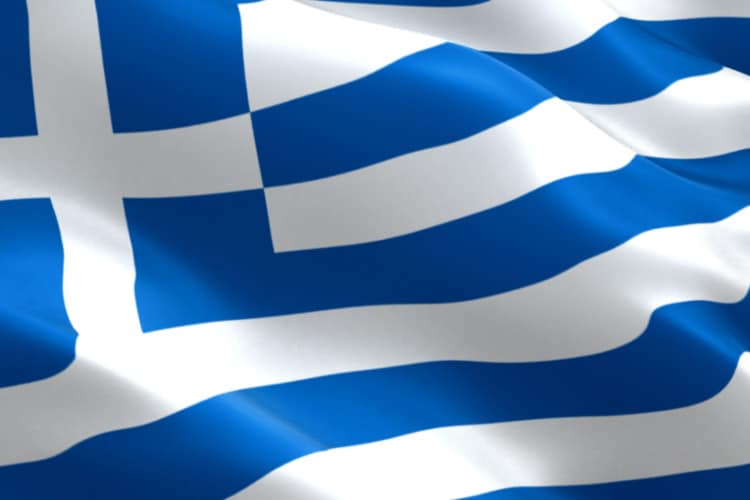
Athens, Thessaloniki, Patras, Piraeus, Larissa, Heraklion, and other such populated areas will have regulated, safe tap water that you can drink. In some places, the water may have an unpleasant taste due to chlorination or may taste brackish.
In less populated areas away from the water networks, you can use the water for cooking or other activities, such as brushing your teeth. However, potability is another question in these regions.
These areas, in addition to rural Crete and the Aegean islands, use aquifers and groundwater and these water sources face problems of pollution and seawater intrusion.
The water comes from local wells, runs through older pipes, and can be hard to regulate, adding further reason to use a filter when using local tap water.
Is Greece Water Hard or Soft?
Water hardness differs depending on the region and type of environment. In Northern Greece, such as Macedonia and Thessaloniki, water is hard but safe to drink.
Water in the south, particularly on the island of Crete and other islands with significant limestone deposits, is very hard. Athens and surrounding Attika have reasonably soft water.
Top 3 Greece Cities with the Cleanest Water
1. Athens
As the largest population center, hosting just under a third of the population, Athens takes the number one spot for the city with the cleanest water in Greece. The city’s water comes from a well-regulated reservoir, Lake Marathon, where the “parent water” is clean and treated with an extensive filtration process.
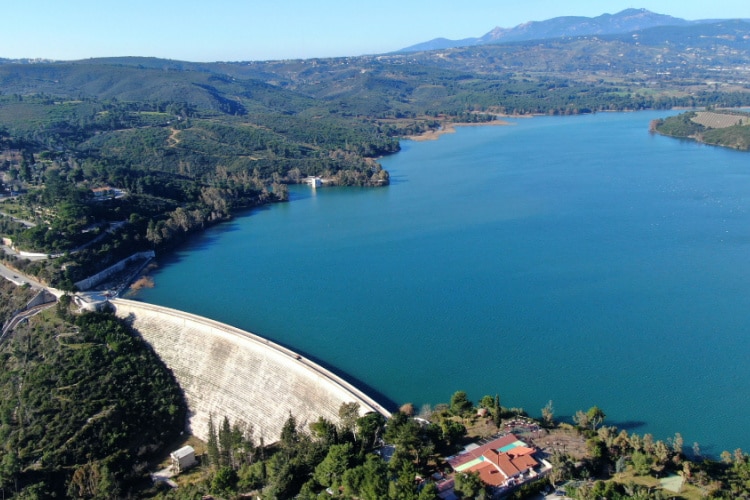
2. Thessaloniki
An international commission also evaluated Thessaloniki’s water and found it clean and potable despite higher limescale levels. Greece’s second city uses treatment centers to add chlorine to its water. This chlorination improves its cleanliness but the taste is affected, becoming sourer.
The tap water, despite the taste, is clean and safe to drink. Some of Thessaloniki’s natives have negative views of the tap water due to the taste.
If you are a traveler, you don’t need to worry about this perception. You can save money and the environment by drinking municipal tap water instead of buying bottled water.
3. Piraeus
Piraeus is a beautiful port city part of the Athens metropolitan network and linked to the same water network as the big city. Some visitors stay here to escape the bustle and noise of central Athens.
Nonetheless, those visitors can enjoy many of the same advantages as Athens. One of those advantages is the clean, drinkable tap water that the entire Attika region enjoys.
Who Regulates Water in Greece?
Two bodies regulate tap water in Greece: the European Union and the Greek government. Within the Greek government, two other bodies regulate the distribution and treatment of water. The Ministry of Environment and Ministry of Interior operate water networks, treatment centers, and testing centers.
These bodies test and check the water according to the 2020 European Union Drinking water directive, which stipulates pollutant concentrations must fall under specific levels for water to be legally called “potable.”
Where Greece Gets its Water From
Greek water comes from four main sources: aquifers, rivers, the Mediterranean Sea, and mountain springs. Most Greek water – up to eighty percent – is from surface sources.
The Greek mainland uses most of its water from aquifers for irrigation and agriculture, which produces pollution through runoff and contaminates rivers and other aquifers.
Greece’s rivers mostly provide water for irrigation. Other rivers provide the parent water at reservoirs, such as lake Marathon.
Greece’s islands get their water from the same sources but often face critical shortages. Thus, some islands acquire water from the ocean and use desalination processes to treat the water.
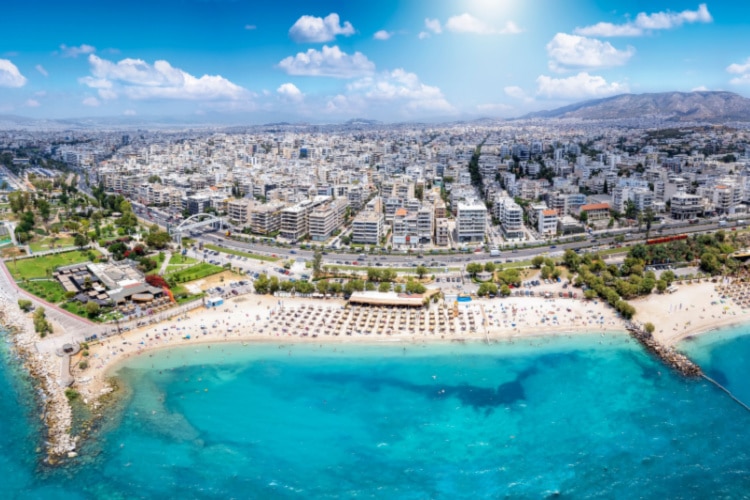
Poorer parts of Greece also face problems with water distribution: outdated pipes made with lead and asbestos, materials known to cause cancer. Consequently, water treatment in Greece has begun to pick up and even work toward replacing old pipes.
How Tap Water is Treated in Greece
Many municipal networks use the process of adding chemicals to kill bacteria and filtering the water through sediment and disinfectants. This process, though reliable and safe, bears responsibility for the aforementioned chlorine test.
Other parts of the country use reverse osmosis as their means of purification. On tourist islands, such as Santorini, Mykonos, and Crete, the government has responded to water stress by using high-tech desalination technologies to remove harmful sea salt from the water.
This does not remove the salty taste from water, leading many tourists to buy bottled water rather than simply drink tap water. Other parts of Greece possess a developing infrastructure and suffer from pollution caused by agriculture and the water treatment process itself.
Old asbestos pipes have not been replaced and are unfortunately contaminating the water during the treatment process. Thus water in areas with older treatment systems is not as safe to drink.
Is Drinking Bottled Water The Safest Option in Greece?
Bottled water is not the safest option in Greece. Though the country may face problems with parts of its water distribution, these regions are still not the majority of the country. Most Greeks consume tap water with no problem whatsoever and even prefer tap water.
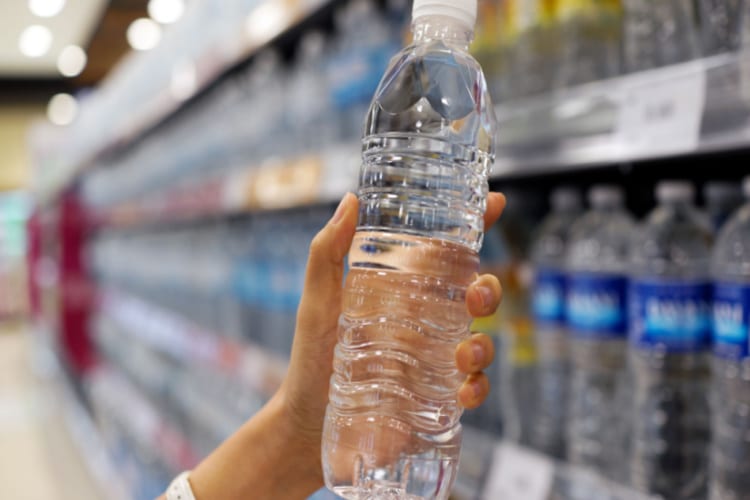
In many regions, particularly around Thessaloniki, all of Attika, and the urban centers, tap water is the safest option.
Even in the islands, or water-stressed regions, bottled water is still not the safest option. Though European Union regulations should, in theory, apply to bottled water in the whole of European Union territory, studies have found several problems with bottled water in Greece.
These problems include but are not limited to:
- Bottles stored at high temperatures
- Untracked water bottle labels and sales
- Labels missing chemical concentrations
Consequently, it is impossible to know the chemical concentration levels in bottled water and how safe it is. In many cases, bottled water is probably less safe than tap water.
This is why we recommend tap water in urban centers and in areas where you are unsure of the water quality, we recommend an even safer option, and one that is less damaging to the environment: water filters.
Are Water Filters Necessary in Greece?
While water filters are not strictly necessary in Athens or Thessaloniki, using them may give the treated tap water in these cities and Greece’s other large cities a better taste by further filtering out the remaining chemicals used to treat the water.
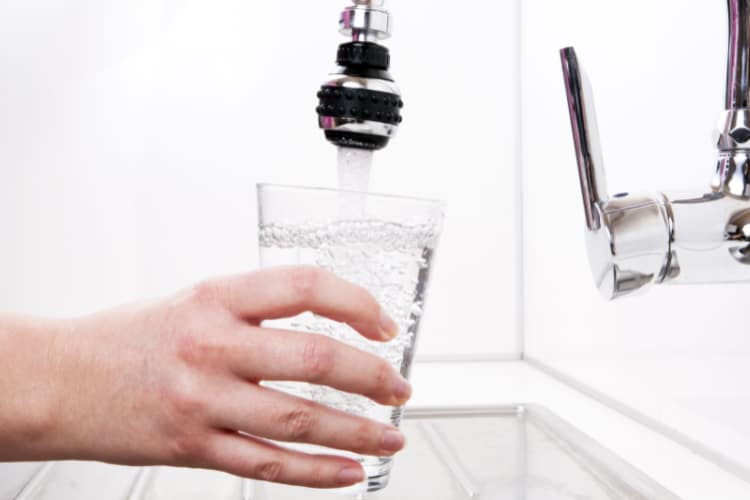
However, they are more necessary in the parts of Greece suffering from water shortages, namely Crete and the Cyclades. Water filters will guarantee you safe drinking water from the tap in these areas at no additional cost, as opposed to bottled water, which may not be safe and will cost extra. Additionally, a water filter will lessen your impact on the environment, as you will produce no plastic waste in your search for safe drinking water.
If you choose to use a filter, use one that can filter out chlorine and metals.
Conclusion
The safety of tap water in Greece depends on the part of the country. Greek cities like Athens and Thessaloniki have clean tap water. In less well-connected parts of Greece, such as the Cycladic islands or the rural mainland, tap water may be less safe and contain contaminants.
These areas can be harder to reach for treatment networks and face economic in addition to environmental issues, which reflects in the quality of some of their water. For these areas, however, the fix is easy; locals tend to use filters to keep their tap water drinkable rather than buy bottled water.